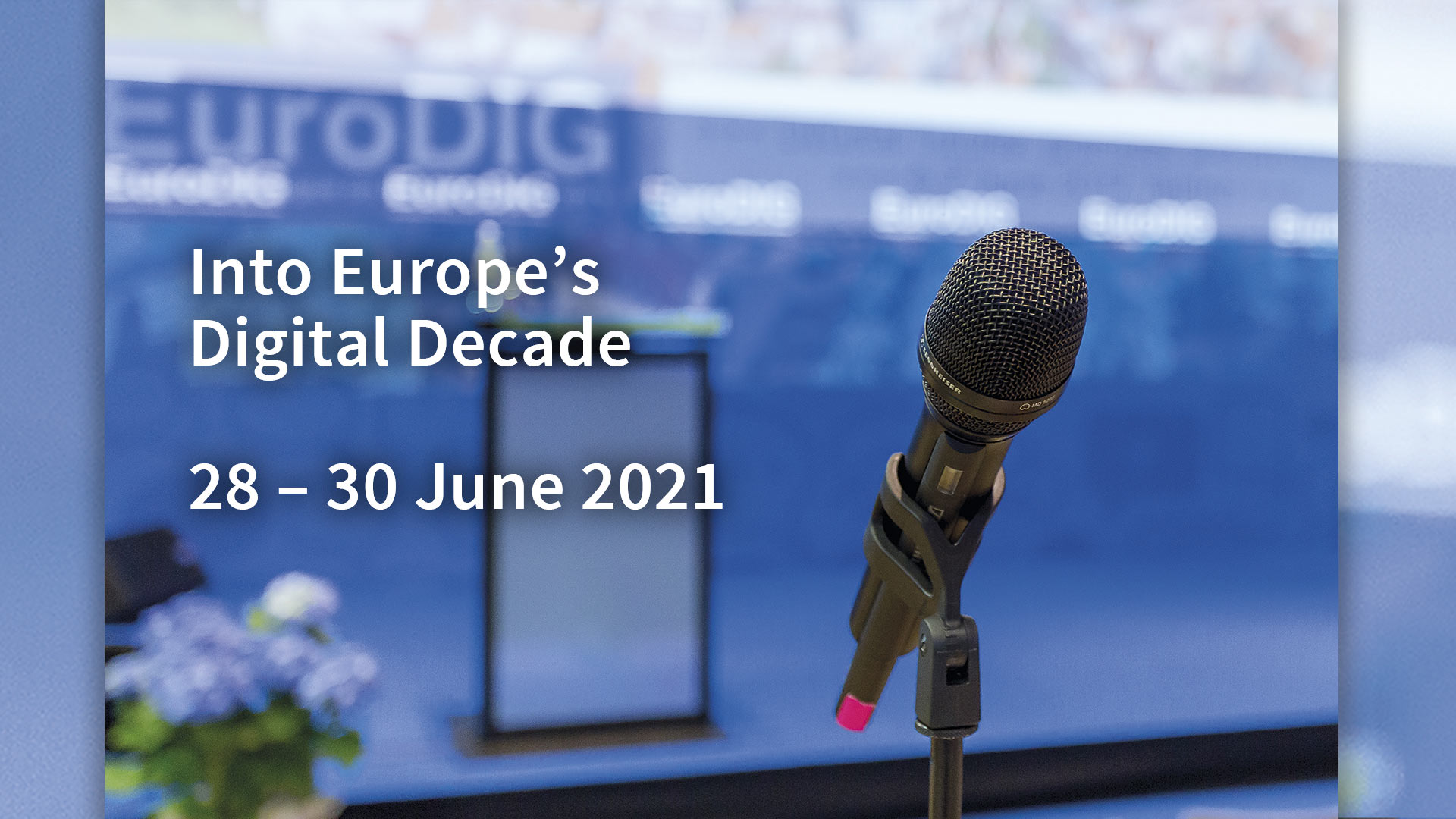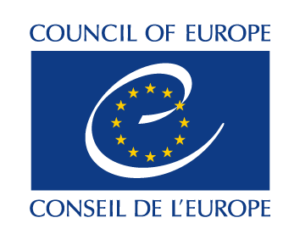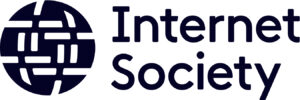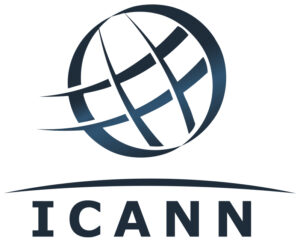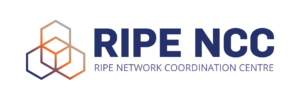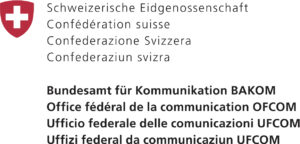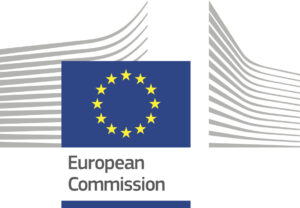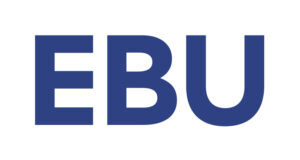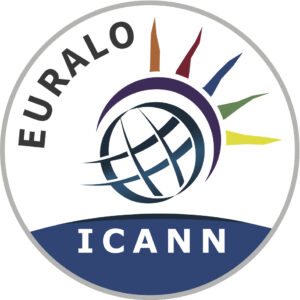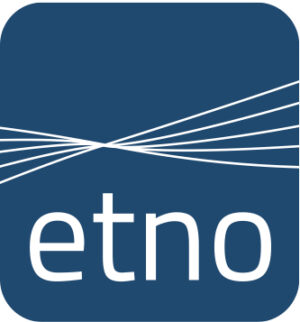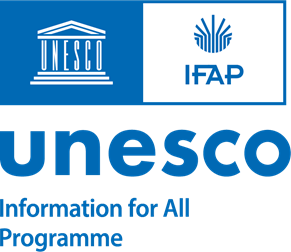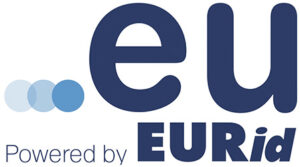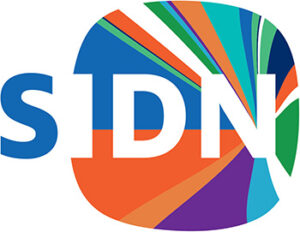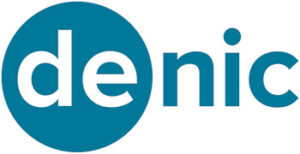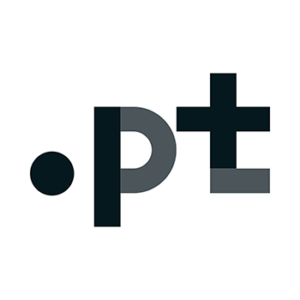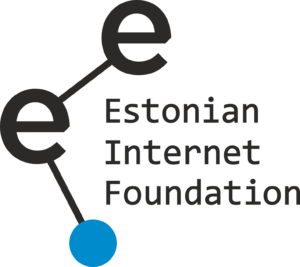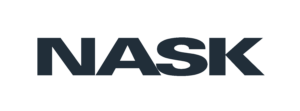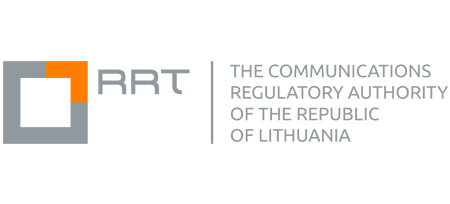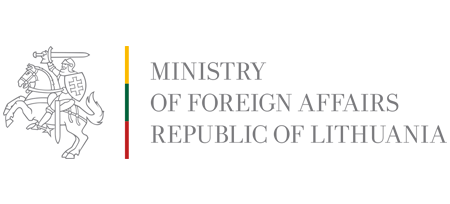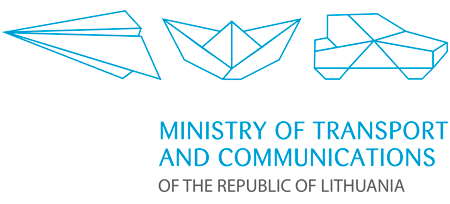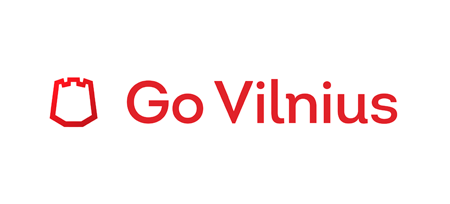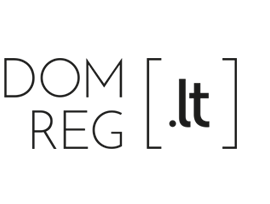Marcel Krummenauer, Sandra Hoferichter, Secretary General EuroDIG
EuroDIG 2021 was the second virtual edition under the limiting conditions of the COVID-19 pandemic, which is one of the most drastic events of recent years, affecting globally all social groups and confronting them with incredible challenges.
Alongside the evident challenges in the public health system, as well as some serious societal developments, the pandemic also brings numerous Internet governance issues to the forefront – starting with the question of whether COVID-19 is ushering in a fundamental digital paradigm shift or merely a short-term societal incision.
Digitalisation is experiencing a true catalysation driven by the crisis. On the one hand, the great technological advances offer numerous new opportunities in research, economy and society; on the other hand, certain groups are left behind. The digital divide in society and the economy is becoming increasingly clear.
At the same time, we need to address further fundamental challenges:
- How can we as a society achieve greater sustainability and security when shaping the digital environment?
- How do we reconcile tendencies towards digital interdependence with the calls for improved digital cooperation at the global level?
- How can we close the digital divide and guarantee access for everyone?
- What role Europe should play in the global disputes?
- What needs to be done in order to build a digitally literate society?
In the context of EuroDIG 2021, these questions, among others, were discussed, preliminary approaches were elaborated and will be pursued further in the course of the next year. Following you can read the key messages from the sessions, which where drafted in cooperation with the Geneva Internet Platform.
Day 0 / 28 June 2021
PRE 10: Open mic: COVID-19 in retrospective. and PRE 10 follow up: COVID-19 – THE Gamechanger?!
Rapporteur: Marcel Krummenauer
- The main question remains: Is COVID-19 ushering in a fundamental digital paradigm shift?
- The digital divide in society and the economy is becoming increasingly clear. Only through fairly allocated investments and efforts in both applied and academic education, (inter)national cooperation as well as governmental regulations it might be possible to stop or even to invert the current trend.
- Many pupils and students have lost both their social and educational connection due to the Corona pandemic. This is, among other things, due to digital didactic concepts that came into focus during the pandemic but are currently not yet fully mature. Consequently, these must be pursued further after the pandemic.
- The efforts towards a sustainable society, as well as the sustainable use of digital resources, are becoming increasingly important. The concrete quantification of the influence of individual actors on the environment is necessary – however, this is becoming increasingly difficult due to the increasing centralisation of capacities.
Day 1 / 29 June 2021
FS 1: Greening Internet Governance, Part II – Enabling an Environmentally Sustainable Digital Transformation in Europe
Rapporteur: Vesna Manojlovic, RIPE NCC
- The implementation of regulatory frameworks that are practical, effective and incentive-based is necessary to promote the environmental sustainability of the ICT sector, measure its impact on the environment, ensure transparency and corporate accountability, increase circular production and consumption, discourage illegitimate exports of e-waste, and to promote material efficiency by increasing the reuse and repairability of devices.
- Standardised methodology and indicators are imperative. Increased cooperation, data sharing, and external auditing are crucial to assess and monitor the environmental impact of the ICT sector, avoid greenwashing, and to promote transparency in data and algorithms and enhance the “de facto” sustainability of the digital world. This would possibly imply different governance structures to provide access to this data.
- Education is a crucial tool for sustainability. On one hand, both academic and practical exchanges of young people are essential for the development of (new) sustainable business models, on the other hand only awareness and transparency can counteract the ever-increasing levels of consumption and lead to informed choices that will help consumers shape their relationship with technological devices.
- More support and inclusion of smaller actors (small and medium-sized enterprises) is key. Decentralization needs to be promoted to limit the strain of energy and resources.
- Sustainability needs to go hand-in-hand with access, as it’s crucial to bridge the digital divide and decrease inequality by developing not only models of ownership, but also models of access.
- In order to maximise benefits from the upcoming “right to repair” legislation, there are needs for improvements on every level: users need to be educated in repair skills , manufacturers need to provide both modular designs, product life-cycle support, and data about every phase; and procuring organisations – public and private sector – need incentives and know-how to choose the products and technologies that initially might require larger investment in both money and skills, but may have larger return on investment over longer time periods.
FS 2: Governing digital interdependence – the role of Europe
Rapporteur: Jamal Shahin, Vrije Universiteit Brussel and UNU-CRIS
- The EU’s strength lies in its focus on a human-centric, collaborative approach to the internet.
- European values can be promoted through development of open and interdependent standards within and outside Europe.
- Specific and targeted regulation is necessary, but too much emphasis on the EU’s regulatory power is counter-productive.
- Digital Sovereignty is not about isolation but about accountability mechanisms.
- Frictionless data portability is a functional requirement for end-users to benefit from individual digital sovereignty.
- Risk management, security technology, and legal instruments are building blocks for trust.
WS 1 and WS1 follow-up: Digital services regulation – opportunities and challenges
Rapporteur: Marilia Maciel, Geneva Internet Platform
- The Digital Services Act package should support an open, diverse, and competitive ecosystem in which small players and European entrepreneurs in particular are capable of thriving.
- The Digital Services Act package should be granular and clear enough so actors can both understand and comply with the regulations, but it also needs to be flexible, and open to revision and updates based on evidence and market response.
- Product design is an important step in achieving norm compliance. Product design should be mindful of existing regulations and, to the extent possible, help to fulfill policy objectives.
- The design of the Digital Services Act package should tackle specific issues such as enhancing clarity of some obligations (including of due diligence obligations), of its geographical application and extraterritorial effects, and of content moderation provisions in the Digital Services Act that could potentially have ‘chilling effects’.
WS 2: Benefits and challenges for unleashing potential of quantum technologies
Rapporteur: Vladimir Radunovic, Geneva Internet Platform
- Quantum technology will allow us to solve very complex problems. Possible applications include optimisation of operations, simulations in chemistry, biology and physics, design of advanced materials, machine learning, and complex quantum networks (‘quantum internet’), as well as breaking (traditional) encryption.
- There is increasing global competition and investment in developing quantum computing for practical use. Current state of the art technology is still very limited and there are no broadly useful applications yet.
- Classical machine learning can help solve complex quantum problems and describe quantum systems. Future steps could include hybrid quantum-classical machine learning, as well as quantum machine learning. Yet quantum supremacy is not so likely soon; to avoid quantum bubble burst (quantum hype), we need to identify the real areas where quantum machine learning outperforms classical machine learning.
- Social challenges due to quantum computing include geopolitical misuse and some sort of ‘armed race’, endangering privacy (due to high ability to break traditional encryption) and disrupting the job market. Society should ‘democratise’ access to quantum technology by all.
WS 3: Data Sovereignty and Trusted Online Identity – COVID-19 Vaccination Data
Rapporteur: Ilona Stadnik, Geneva Internet Platform
- The use of data and authentication methods are proliferating, but legal frameworks for data governance need to rapidly address the concerns of the governments, private sector, and citizens.
- Privacy, security, and sovereignty concerns are moving to the background of COVID-19 vaccination certification process.
- In designing authentication frameworks we should bring to the table all proposals from both the public and private sectors, and from citizens themselves.
- It is important for a citizen to know how their data is used, stored, and secured: what are the stages, who has access at each particular point.
- Citizens should have a choice to control how their data is used by different entities in a centralised or a decentralised manner.
- Both the public and private sectors should work to develop a better visualisation of authentication frameworks comprehensible by citizens.
- In developing innovative identification and authentication governance frameworks, we should keep in mind interoperability issues in order to ensure consistency in technology standards for the normalisation of data, while including consented use of such data.
WS 4: New developments and prospects in data protection (with regard to AI)
Rapporteur: Katarina Andjelkovic, Geneva Internet Platform
- AI has added a new layer to issues of privacy, data protection, and other human rights and freedoms. In this sense, the focus on data is no longer enough in order to address all of the issues. The proposed regulations, therefore, intend to go beyond data protection and to consider the potential consequences and negative impacts of the use of AI.
- The development of AI requires a paradigm shift. There is a need to move from a human-centred approach to a planet-centred approach and use AI technologies to achieve the 2030 Agenda on Sustainable Development.
- The main problem is that users do not usually know what data they share on the internet on a daily basis and how this data is used. Therefore, investment in educational programs and raising awareness is key to help users understand AI technologies, their benefits as well as their risks.
WS 5: Crypto Wars 3.0 – can privacy, security and encryption co-exist?
Rapporteur: Boris Ohanyan, Geneva Internet Platform
- Trust in encrypted communication is necessary in a democratic society, but this trust will be undermined by simple access of authorities to encrypted messages. This would be the end of free communication: it will not prevent criminals from encrypting their communication in an unbreakable way, but it will weaken everybody’s encryption. Solution thus cannot be worse than the problem.
- The focus should shift from generic regulations on allowing law enforcement to break encryption to open discussions with law enforcement agencies on the requirements for when and how to do so.
- False framings and false dichotomies around encryption, privacy, and security should be avoided. Terms and concepts need to be better specified to avoid misunderstanding and inconsistency around their use.
- Better multistakeholder engagement to consider the consequences of technological advances is necessary. At the EU level, concrete actions need to be taken to ensure formal structures for such engagement and to overcome the existing divide of frameworks and scattered discussions and debates.
WS 6: Copyright – Implementation of the EU directive
Rapporteur: Nataša Perućica, Geneva Internet Platform
- Copyright can contribute to negative trends such as surveillance and control on the internet. There is therefore the need to combat such a practice and the idea that machines can govern what we can see or read on the internet.
- On copyright infringement: Whereas filters are designed to identify matches between different sources, they are not designed to recognise context.
- Content control requires supervision to make sure that the impact on different stakeholders is proportionate. An institutional mediator needs to be established or an existing actor should be given legitimacy to deal with content control.
WS 7: Human vs. algorithmic bias – is unbiased decision-making even a thing?
Rapporteur: Katharina Hone, Geneva Internet Platform
- Algorithmic bias is a particular concern regarding sensitive decisions with human rights implications. Ultimately, the outcomes of machine learning should be seen as only one input into decisions eventually taken by humans.
- A broad understanding of bias is warranted to address discrimination and harm. Bias can materialise at all steps of developing and using a particular AI system. This includes decisions about the algorithms, data, and the context in which the system is used. There are also mechanisms to make humans and machines work together better for better decisions.
- Policies need to mitigate risks of algorithmic decision-making. Constraints, safety mechanisms, audit mechanisms, and algorithmic recourse all need to be in place. In addition, it is crucial, as a first step, to work towards greater transparency and explainability of AI systems involved in decision-making. Databases that list the AI systems and data in use should be considered, as well as bans on the use of certain AI systems with high risk and high harm.
- A number of technological companies have self-regulation mechanisms in place at various levels. Self-regulation of the private sector is important but ultimately not enough. Various regulatory efforts need to complement each other and greater cooperation between various stakeholders is needed to create synergies.
- Equality and fairness are values that have a strong cultural connotation. They are important principles to address bias, yet it is not easy to find an intercultural agreement on some aspects of these principles. Addressing algorithmic bias also needs to include discussion on what kind of society we want to live in in the future.
WS 9: Content moderation on the Internet infrastructure level – Where does censorship begin?
Rapporteur: Ilona Stadnik, Geneva Internet Platform
- The DSA is aimed at modernising relevant rules and limiting legal uncertainty for addressing risks in digital space, including the key question of liability of service providers, including necessary technical auxiliary functions.
- Infrastructure intermediaries have been in the legal ‘shadows’ since the 2000 e-Commerce Directive. Today we face the necessity to clarify liability exemptions and elaborate explicit categorisation of digital services.
- Recent cases show that certain infrastructure providers unwillingly take action that could be argued to be content moderation by suspending services for the platforms in an ad-hoc manner without any transparent policy. But infrastructure services have limited possible options, which tend to be temporary solutions (clearing cache), overbroad reactions (limiting access) or options that open up websites to cyberattack (terminating services of particular users).
- We should keep in mind the proportionality of measures to target illegal content and foresee the unintended consequences on the infrastructure level. Current content moderation practices are not ideal and transparency reports are not very helpful to escape the mistakes, so what can be expected from the broader infrastructure level?
WS 13: Doing everything online – mental wellbeing vs. digital addiction effects on human interaction
Rapporteur: Boris Ohanyan, Geneva Internet Platform
- A holistic approach, involving business, governments, civil society, and the education system, is needed to ensure that online products and platforms are designed and used in a way that promotes mental well-being.
- Media literacy and education should be integrated in the school system.
- More research on digital addiction is needed. Further, research skills of teachers and educators can be enhanced to ensure that they can contribute to the observation of behavior in the digital environment.
Day 2 / 30 June 2021
FS 3: New European proposals – NIS2 and cybersecurity agenda
Rapporteur: Peter Van Roste, CENTR
- FYI: companies outside EU have to choose a representative in EU (DNS, cloud, data centre, search engine)
- Might be worth to further look into or discuss horizontal vs vertical approaches when defining scope and seeking alignment between NIS2 and other instruments (e.g. EECC)
- Multistakeholder bodies rely on multilateral bodies for their support, rather then trying to immediately seek multi-lateral solutions
- Need to educate companies on what is applicable to them, help them and guide them into compliance
- Concerning registration data, GDPR defines the principles that data controllers should follow. NIS2 is compliant with these principles.
- There are existing policies within European ccTLDs to ensure registration data accuracy, dependent on national laws and availability of eID solutions.
- More clarity is needed on accountability and the roles of different entities under the scope of NIS2.
FS 4: European mediascape – How to (re)create a trusted public sphere?
Rapporteur: Yrjö Länsipuro, EuroDIG
- Support was expressed for innovative efforts to create trusted European media space, by all relevant actors, from EP to media organizations as the EBU
- DSA, DMA are the first step to deal with the existing dominance of platforms. But all regulation (incl. copyright-related) should avoid causing unintended consequences and respect human rights and fundamental values
- One institution alone cannot solve the problem. Multistakeholder approach is needed to build a harmonious system where elements of hard and soft regulation are in balance, within their respective boundaries, mandates and accountability mechanism. Platforms, in particular, have a big stake in the functioning of the system, and should be required to develop transparent self/co-regulation.
- In the last line of defense are individual users, each of them perceiving content within their own context. Those defenses should be strengthened by media education.
WS 8: International access to research content and sensitive data
Rapporteur: Marco Lotti, Geneva Internet Platform
- Despite many initiatives for open science existing both at the regional and international levels, more can be done. Cooperation issues (different stakeholders have different views and interests) and logistical issues (e.g. digital divide and resources available) still pose challenges. UNESCO has actively and recently taken steps to favour international cooperation on open science, precisely stressing the existing common values shared by the international community.
- On the infrastructure level, the main challenges are twofold. As the European Open Science Cloud (EOSC) case shows, a part of the challenge is linked to the development of platforms and services (and their funding) that allows for an open environment. On the other hand, security remains the main concern, especially in the case of cloud solutions. As a big part of the data at stake is sensitive, good security practices need to be put into place at the technical level and thought of since the design of such platforms (e.g. access restrictions, data licensing, PID assignments, and data anonymisation).
- Ensuring security and trust is not only a technical matter but also a legal one. In the existing legal framework, there are already good and solid principles regulating access and sharing of Data (e.g. CoE Convention on HR and Biomedicine, the EU’s GDPR and Draft on AI regulation). In any case, to ensure the maximum respect of individuals’ human rights the interest and welfare of the human beings shall prevail over the sole interest of society and science.
- However, the implementation of such legal principles in everyday scientific practice still remains an issue especially when it comes to what type of data is at stake and at which part of the data cycle the activity takes place. In this regard, it is essential to bridge the gap between policymakers and the scientific community through dialogue and education to ensure that the policies take into account the needs of researchers.
WS 10: Fake News – Dissolving Superstitions with Media Literacy
Rapporteur: Natasa Perucica, Geneva Internet Platform
- Manipulation of media sources whether in the form of disinformation or misinformation can fuel violent conflict.
- One crucial aspect of media literacy is to educate an audience that in most cases determines the context of a message through the lens of all kinds of prior information, including knowledge, experience, and attitudes.
- Youth need a deeper understanding and knowledge of media literacy to be able to discern the accuracy of sources.
WS 11: Recent studies on accessing educational content
Rapporteur: Andrijana Gavrilovic, Geneva Internet Platform
- We should develop a culture about tools that can be adapted to optimise e-learning. The criteria of validating the use of a certain tool should include self-determination, digital autonomy and ethics, and human rights. Pedagogical objectives and the learning moment are also important factors in choosing a tool.
- It is important to note that digital should adapt to the learner’s needs, not the reverse. Tutors and facilitators should have the skills to navigate through digital and choose the best tool for their learners.
- Education needs to evolve in terms of content, but also needs to safeguard the public values that we want to transfer. We need to ensure that we safeguard those public values and that they are not manipulated by e-learning platforms and their embedded values. We need to ensure that the tools do not inherit the bias of the industry which developed the software.
- We need to build in the respect for digital autonomy of people in the foundational structure of the tools used for e-learning. We need to ensure that the tools accommodate insecurity about our data, insecurity about our learning process, loneliness, lack of socialisation, and lack of interoperability with other tools.
- It is of essential importance to have a tool that makes the discovery of educational content easier for teachers and students regardless of the platform on which the content is hosted.
WS 12: Best practices of self- and co-regulation of platforms towards a legal framework
Ilona Stadnik, Geneva Internet Platform
- Liberal approaches of governments towards online platforms at the start of the platform economy led to the rise of platform power to influence the public sphere. Though we have soft law arrangements like voluntary codes of conduct to regulate harmful content, they are not sufficient to address serious problems like extremist content and disinformation while ensuring the right to free speech.
- Self-regulation, co-regulation, and multistakeholder/multidisciplinary governance models are challenged with the need to reconcile different accountability and power structures that exist within them. Of additional importance, they should have internal and external legitimacy.
- Externally, a governance model must be recognised for the quality and timeliness of its decisions; internally, it has to have robust checks and balances.
- There should be a global collaborative effort in the form of dialogic regulation between governments, tech companies, and civil society to develop a solution grounded in human rights that will address disinformation and harmful content.
WS 14: Privacy impact of COVID19-related shift to online activities (payments, virtual meetings …)
Rapporteur: Arvin Kamberi, Geneva Internet Platform
- In the field of online participation and online work, we need to start introducing more thorough privacy policies, and appropriate training for present and future remote industries.
- Digital literacy is important to prevent increased attacks on users in the financial sector. This was evidenced by all sorts of scams and attacks amplified during the period of extensive use of online finance.
- With the introduction of online tools in telemedicine, online education, and the public sector, a big task will be to actively promote the idea that data protection is not an obstacle to productivity and innovation.
- Even with the GDPR in place, compliance of services is often overlooked in search of the right balance on tech advancements and user rights. A good way forward might be to see what the specific goal is, and address that particular issue. Data protection is a different issue for different users. We might need a talk on how the future of data protection will look like.
WS 15: 5G User perspective and implementation
Rapporteur: Ilona Stadnik, Geneva Internet Platform
- For Europe, the development of high speed communications infrastructure, 5G in particular, is a strategic priority. The COVID-19 pandemic acted as a catalyst for a faster rollout.
- 5G networks may bring certain risks for security and privacy. We need to conduct a thorough assessment of all risks, including consequences for the future of work, health, and the environment, and involve industry and other stakeholders to address these issues when deploying 5G networks.
- We need to keep in mind economic and legal challenges that EU member states face – absence of cohesion in national spectrum policies and in security and safety requirements – which hinder the rapid deployment of 5G.
WS 16: Delay-Tolerant Network (DTN)
Rapporteur: Andrijana Gavrilović, Geneva Internet Platform
- DTN networks on Earth are an example of an early entry into the community network trend that is now becoming so important. There are unexplored uses for DTN in emergencies and even under conditions of network shutdown by repressive governments.
- We need to pay attention to the underserved communities and find the solutions to offer them services.
- We might need to consider regulation about the use of frequencies for applications on Earth as well as in space.
- The Solar System Internet effort is a serious attempt to plan for a real network to support manned and robotic exploration of the Solar System.
- The DTN technology and the bundle protocol, originally developed for space exploration, can be used by applications on Earth. Applications on Earth can be used as test bed for space applications development, as is the case for the Sámi reindeer herd tracking and for Karst cave meteorological data collection.
WS 17: Competition in the digital ecosystem – Europe and beyond
Rapporteur: Boris Ohanyan, Geneva Internet Platform
- The European rules on competition in the digital landscape need to be simple and efficient. Simple, clear rules will make it easy for smaller companies to understand and follow them without profound legal expertise. Efficient rules are needed to tackle monopolies ex ante, before it is late to break up the monopolies that are usually formed very fast in the digital environment.
- There is a lack of interoperability between various online services and platforms. From the European perspective, there are ongoing initiatives pushing for more interoperability, but the coverage of such rules needs to include more services and platforms.
- A multilayered and multistakeholder approach is needed to tackle competition issues in the digital. The regulatory frameworks should establish the general principles to be followed, and this is a long-term process. There is also room for ethics frameworks and standards to guide future policy. In addition, multistakeholder involvement can help ensure that the regulation and the established principles are not watered down because of quickly evolving realities in the market.
